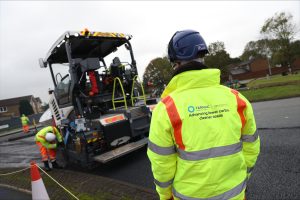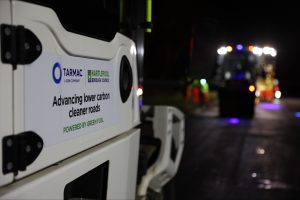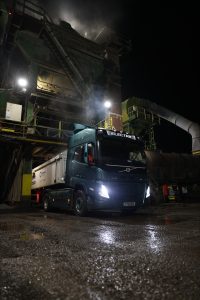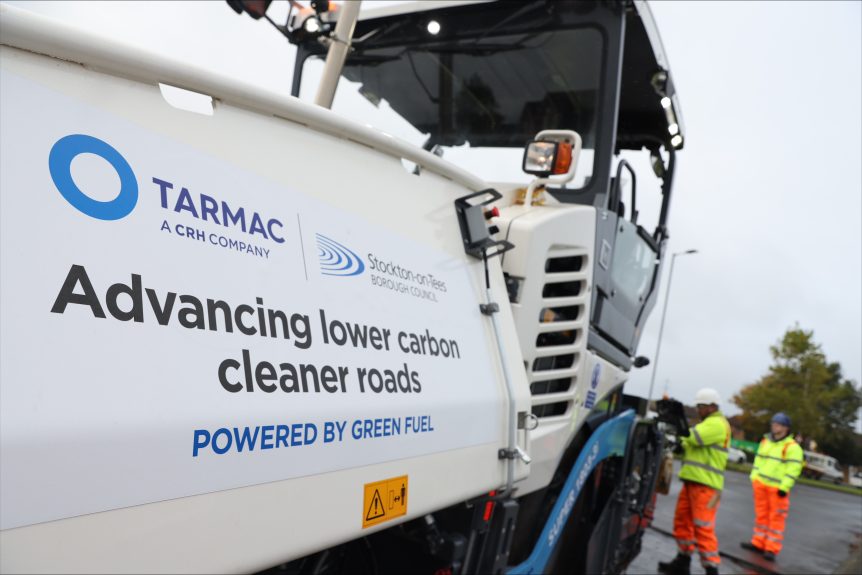Three local roads in the north east have become the lowest carbon highways ever to be resurfaced in the UK, thanks to a project that has set a new benchmark for the way roads are maintained.
Working in partnership with Hartlepool Borough Council and Stockton-on-Tees Borough Council together with international partners including Shell, Volvo CE, Wirtgen and JCB, Tarmac, a CRH company, has reduced the carbon emissions of the road schemes by up to 80 per cent compared to projects using traditional methods. It is understood these projects have the lowest CO₂ emissions for road resurfacing in the UK without using carbon offsetting.
The project team combined an extensive range of low carbon materials, techniques and plant equipment for the very first time to resurface a section of the A689 in Wynyard, near Hartlepool, and two residential roads in Stockton-on-Tees Borough.

Warm mix asphalt was used together with a new bio-component binder from Shell which uses bio-genic materials to create a technical carbon sink in the road to prevent carbon being released into the atmosphere.
The surface course and lower layer of the pavements used 30 per cent recycled asphalt planings (RAP) in the lower layer and 20 per cent in the surface course to reduce the need for primary materials. Tarmac’s asphalt manufacturing plant at Coxhoe was powered by a combination of bio-fuel and electricity.
A number of electric plant vehicles and prototypes were supplied by partners such as Volvo and Wirtgen, including electric and hybrid road rollers and an electric bond coat sprayer. Other plant vehicles were powered by hydrotreated vegetable oil (HVO), provided by Certas Energy, as an alternative to diesel. Materials were also kept in stores provided by ZappShelter, to minimise the energy needed to dry them out before producing asphalt, and Greener Power Solutions provided a battery unit.
Commenting on the delivery of the project, Brian Kent, technical director at Tarmac, said: “While this project has delivered local environmental benefits in the north east, it’s also nationally significant because it provides a blueprint for how to decarbonise every element of highways delivery. Our team has shown that it’s possible to significantly turn the decarbonisation dial with new material technologies, cutting-edge plant and collaborative working with local authorities and the supply chain.
“To replicate this approach on every project will require further investment and scaling up of technology across the industry. It’s now important that we take learnings from this ground-breaking project to help inform further decarbonisation across the local and strategic road networks.”

Ana Alvernhe, general manager, Shell Construction & Road, said: “We’re delighted to contribute towards the construction of the UK’s lowest carbon road using our biogenic bitumen. Shell bitumen CarbonSink ensures that the carbon captured in the biogenic material remains locked in the bitumen and asphalt, turning the road into a technical carbon sink. This scheme is an excellent example of the supply chain working together towards the journey to net zero.”
Councillor Mike Young, Leader of Hartlepool Borough Council, said: “The Tees Valley is an area renowned for innovation, and I’m delighted and proud that we are leading the way nationally – in partnership with Tarmac – with these low-carbon road resurfacing schemes.
“Schemes such as this reflect the Council’s determination to reduce its carbon footprint to help tackle the causes of climate change. We are committed to becoming a “Net Zero” emissions authority by working in partnership with a range of stakeholders. To help us achieve this, we are currently developing a strategy and action plan. This is building on work we are already delivering in a number of key areas such as home energy efficiency and renewables.”
Councillor Clare Gamble, Stockton-on-Tees Borough Council’s Cabinet Member for Environment and Transport, said: “We’re so pleased to be the first area in the country to have the lowest carbon emission roads as schemes like this are a big part of our commitment to achieve a Net Zero future.
“The Council is always looking for ways to reduce our carbon footprint and do all we can to help fight climate change including things like more environmentally sustainable road networks. We’ve made significant progress across several environmental measures, having reduced our greenhouse gas emissions by nearly 60 per cent over the past ten years.
“The state-of-the-art technology used by Tarmac from development to delivery of these highways has created an environmentally sustainable, durable road surface that will last for years while reducing carbon as much as possible. It will benefit people in our Borough for many generations to come.”
 Darren Fitch, head of market area GB, Ireland, Benelux and Iceland, Volvo CE, said: “We at Volvo CE need to do our part – by producing sustainable construction equipment and charging solutions – but policymakers and authorities must also do their part to support the decarbonisation transition. 2030 may seem far away, but it is coming quickly and we need action if we have a chance to reach the ambitions of the Paris Agreement. Stepping up and using our collective power – as we demonstrate here with this holistic end-to-end partnership – will strengthen our ability to do more and achieve more for the environment.”
Darren Fitch, head of market area GB, Ireland, Benelux and Iceland, Volvo CE, said: “We at Volvo CE need to do our part – by producing sustainable construction equipment and charging solutions – but policymakers and authorities must also do their part to support the decarbonisation transition. 2030 may seem far away, but it is coming quickly and we need action if we have a chance to reach the ambitions of the Paris Agreement. Stepping up and using our collective power – as we demonstrate here with this holistic end-to-end partnership – will strengthen our ability to do more and achieve more for the environment.”
Paul Holmes, Managing Director, Wirtgen Limited, said: “We’re committed to contribute towards the construction of the lowest carbon roads in the UK by providing a production system from milling, through crushing & screening, asphalt mixing, laying and compacting with the view to net zero.”
Andrew Parker, UK sales manager at Greener Power Solutions, said: “At Greener Power Solutions, we are deeply committed to reducing CO₂ emissions. Although we are striving to achieve this goal as an independent entity, we recognise that we can make a much more significant impact by collaborating with Tarmac, CRH and their partners to provide cleaner power to construction sites and road development projects throughout the UK.”
Craig Michel, managing director at Zappshelter, said: “We are delighted to be playing a vital part in this cutting-edge decarbonisation project where the limits are being pushed through new methods and technology in the search for truly zero carbon road networks.
“Together we are aiming to produce the lowest carbon road ever produced in the United Kingdom – a true milestone in a national drive towards our net zero goals, and we’re proud to be involved.”
Niki Holt, head of commercial at Certas Energy, said: “Certas Energy is delighted to be involved in this trail-blazing project and to work in close collaboration with Tarmac as their energy transition partner of choice. HVO is a truly transformative transitional fuel which will play a pivotal role in the roadmap to net zero. By switching from standard diesel to Certas Energy HVO, businesses in the built environment sector can simply and seamlessly lower their fuel-related greenhouse gas emissions by up to 90 per cent.
“With a guaranteed and reliable supply of premium HVO, Certas Energy is proud to be helping commercial customers nationwide to evolve their energy mix, cut their carbon footprint, and take meaningful steps towards their sustainability goals.”

